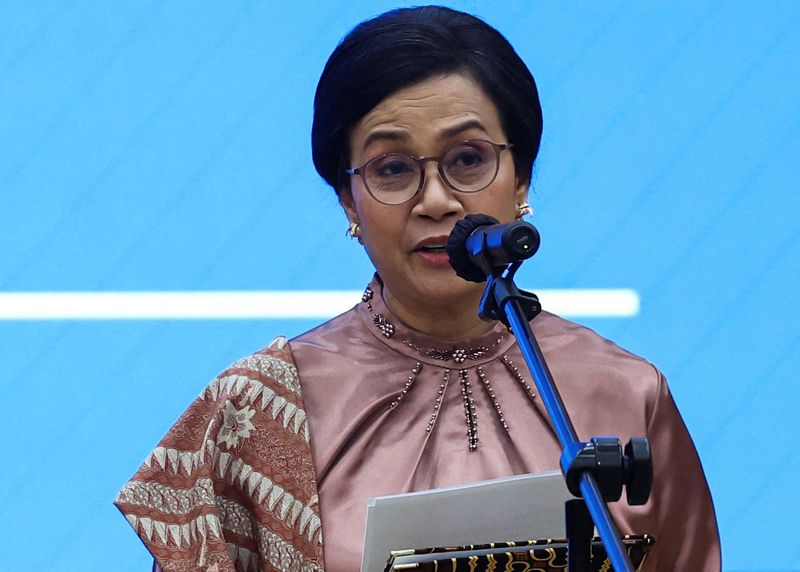By Ananda Teresia and Stefanno Sulaiman
JAKARTA (Reuters) -Indonesia’s Finance Minister Sri Mulyani Indrawati was chairing a meeting with top ministry officials when she received a call from President Prabowo Subianto’s office informing her she would be replaced within an hour, two sources said, underscoring the abruptness of the longtime finance czar’s sacking.
Sri Mulyani, known for her cautious steering of Southeast Asia’s largest economy that won the confidence of markets, was widely regarded as one of the few checks on Prabowo’s big growth and spending promises that had unnerved many investors.
Prabowo kept her on when he took power last year in a signal of policy continuity from the largely stable reign of his predecessor, but the relationship came to a sudden end less than a year in.
Two sources with direct knowledge of events leading up to Sri Mulyani’s ousting on Monday told Reuters on condition of anonymity that she was in a meeting after 2:30 p.m. (0730 GMT) when she got a call from one of Prabowo’s closest aides.
The official announcement came less than an hour later that she had been replaced by economist Purbaya Yudhi Sadewa.
“She was supposed to have a (meeting) agenda with the president in the morning that day, but it was cancelled,” said one of the sources, who is close to Sri Mulyani.
Sri Mulyani and the President’s office did not immediately respond to Reuters’ requests for comment.
It had previously been unclear if she resigned or was removed. The sources, both close to the ousted minister, one of whom was in the ministry, confirmed Sri Mulyani was asked to leave.
One more government source confirmed she did not resign, but did not comment on the chain of events.
MARKET STABILITY
Sri Mulyani and Prabowo were peers in the cabinet of President Joko Widodo from 2019 to 2024, with the latter serving as defence minister.
One of the sources said Prabowo only hired Sri Mulyani because of a push from three former presidents and to give stability to the markets.
They said Sri Mulyani’s prudent approach was at odds with Prabowo’s big spending plans, with projects such as the ambitious – and expensive – free meals programme for 82.9 million Indonesians.
The programme will get a massive boost with a $20.7 billion budget in 2026 – almost double that of this year – while other areas such as funding for regional governments were cut to control the fiscal deficit.
While Sri Mulyani – who served under three presidents across two stints as finance minister – tried to accommodate Prabowo’s policies, the two barely met, the source said, as communication with the president had become increasingly difficult.
The sources told Reuters Sri Mulyani was shaken after one of her homes was looted during two weeks of protests and unrest against government spending priorities and tax plans.
Prabowo asked during a cabinet meeting if she was okay after the looting and she responded in the affirmative and continued in the role, two sources said, adding everything ran normally until Monday.
FISCAL DIFFERENCES?
While it was unclear why Sri Mulyani was replaced, economists believe the two did not see eye-to-eye on fiscal matters.
Earlier this year, Prabowo established a new sovereign wealth fund and appointed high-profile advisers known for risk-taking in business and investment, with the aim of strategically leveraging more of its assets to spur growth.
A source in the fund, who declined to be identified, said at least one adviser told Prabowo Sri Mulyani’s fiscal conservatism was not compatible with higher growth targets.
Indonesian law says the fiscal deficit cannot exceed 3% of GDP – a safeguard against the kind of economic instability that rocked the country in the late 1990s under authoritarian leader Suharto.
While that law has long been respected – particularly under Sri Mulyani – many detractors see fiscal conservatism as a growth impediment, including Prabowo, who said prior to taking office that Indonesia could take on more debt.
(Additional reporting and Writing by Gibran Peshimam; Editing by Alex Richardson)









